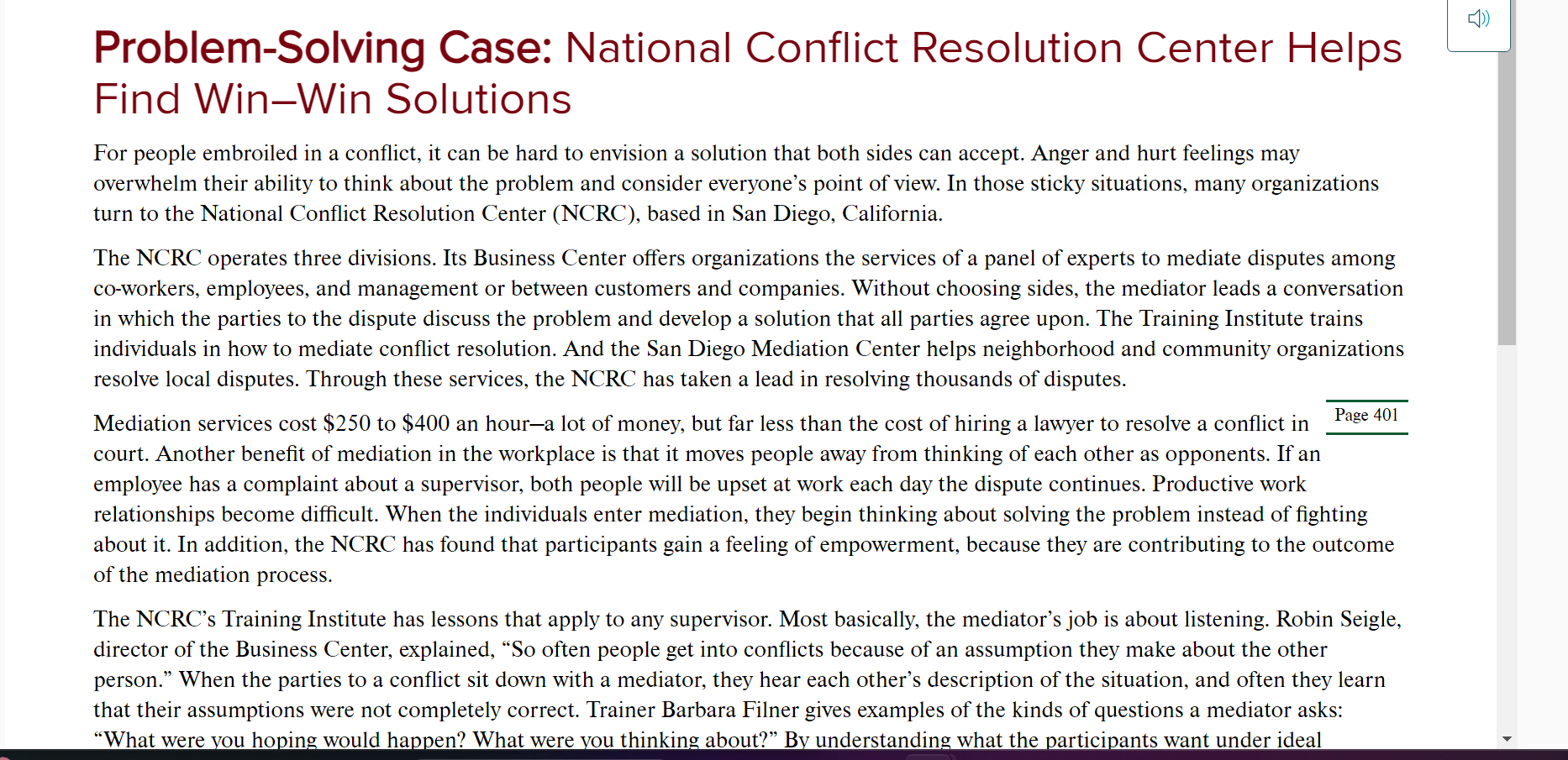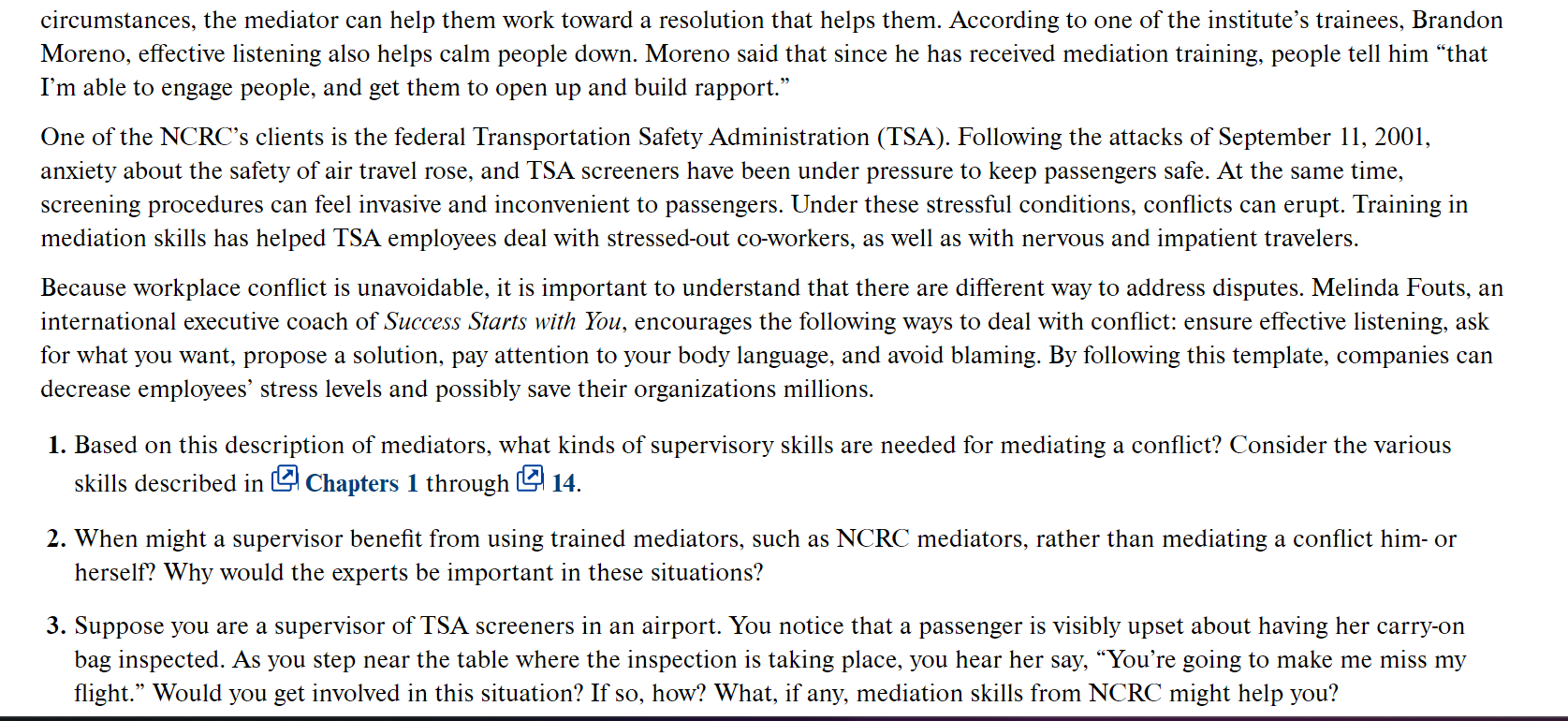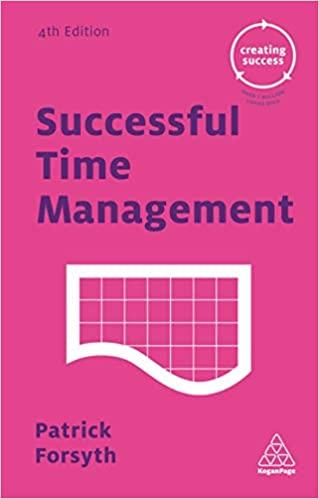Answered step by step
Verified Expert Solution
Question
1 Approved Answer
Problem-Solving Case: National Conflict Resolution Center Helps Find Win-Win Solutions For people embroiled in a conflict, it can be hard to envision a solution that

 Problem-Solving Case: National Conflict Resolution Center Helps Find Win-Win Solutions For people embroiled in a conflict, it can be hard to envision a solution that both sides can accept. Anger and hurt feelings may overwhelm their ability to think about the problem and consider everyone's point of view. In those sticky situations, many organizations turn to the National Conflict Resolution Center (NCRC), based in San Diego, California. The NCRC operates three divisions. Its Business Center offers organizations the services of a panel of experts to mediate disputes among co-workers, employees, and management or between customers and companies. Without choosing sides, the mediator leads a conversation in which the parties to the dispute discuss the problem and develop a solution that all parties agree upon. The Training Institute trains individuals in how to mediate conflict resolution. And the San Diego Mediation Center helps neighborhood and community organizations resolve local disputes. Through these services, the NCRC has taken a lead in resolving thousands of disputes. Mediation services cost $250 to $400 an hour-a lot of money, but far less than the cost of hiring a lawyer to resolve a conflict in Page 401 court. Another benefit of mediation in the workplace is that it moves people away from thinking of each other as opponents. If an employee has a complaint about a supervisor, both people will be upset at work each day the dispute continues. Productive work relationships become difficult. When the individuals enter mediation, they begin thinking about solving the problem instead of fighting about it. In addition, the NCRC has found that participants gain a feeling of empowerment, because they are contributing to the outcome of the mediation process. The NCRC's Training Institute has lessons that apply to any supervisor. Most basically, the mediator's job is about listening. Robin Seigle, director of the Business Center, explained, "So often people get into conflicts because of an assumption they make about the other person." When the parties to a conflict sit down with a mediator, they hear each other's description of the situation, and often they learn that their assumptions were not completely correct. Trainer Barbara Filner gives examples of the kinds of questions a mediator asks: "What were you hoping would happen? What were you thinking about?" By understanding what the participants want under ideal circumstances, the mediator can help them work toward a resolution that helps them. According to one of the institute's trainees, Brandon Moreno, effective listening also helps calm people down. Moreno said that since he has received mediation training, people tell him "that I'm able to engage people, and get them to open up and build rapport." One of the NCRC's clients is the federal Transportation Safety Administration (TSA). Following the attacks of September 11, 2001, anxiety about the safety of air travel rose, and TSA screeners have been under pressure to keep passengers safe. At the same time, screening procedures can feel invasive and inconvenient to passengers. Under these stressful conditions, conflicts can erupt. Training in mediation skills has helped TSA employees deal with stressed-out co-workers, as well as with nervous and impatient travelers. Because workplace conflict is unavoidable, it is important to understand that there are different way to address disputes. Melinda Fouts, an international executive coach of Success Starts with You, encourages the following ways to deal with conflict: ensure effective listening, ask for what you want, propose a solution, pay attention to your body language, and avoid blaming. By following this template, companies can decrease employees' stress levels and possibly save their organizations millions. 1. Based on this description of mediators, what kinds of supervisory skills are needed for mediating a conflict? Consider the various skills described in Chapters 1 through 14. 2. When might a supervisor benefit from using trained mediators, such as NCRC mediators, rather than mediating a conflict him- or herself? Why would the experts be important in these situations? 3. Suppose you are a supervisor of TSA screeners in an airport. You notice that a passenger is visibly upset about having her carry-on bag inspected. As you step near the table where the inspection is taking place, you hear her say, "You're going to make me miss my flight." Would you get involved in this situation? If so, how? What, if any, mediation skills from NCRC might help you
Problem-Solving Case: National Conflict Resolution Center Helps Find Win-Win Solutions For people embroiled in a conflict, it can be hard to envision a solution that both sides can accept. Anger and hurt feelings may overwhelm their ability to think about the problem and consider everyone's point of view. In those sticky situations, many organizations turn to the National Conflict Resolution Center (NCRC), based in San Diego, California. The NCRC operates three divisions. Its Business Center offers organizations the services of a panel of experts to mediate disputes among co-workers, employees, and management or between customers and companies. Without choosing sides, the mediator leads a conversation in which the parties to the dispute discuss the problem and develop a solution that all parties agree upon. The Training Institute trains individuals in how to mediate conflict resolution. And the San Diego Mediation Center helps neighborhood and community organizations resolve local disputes. Through these services, the NCRC has taken a lead in resolving thousands of disputes. Mediation services cost $250 to $400 an hour-a lot of money, but far less than the cost of hiring a lawyer to resolve a conflict in Page 401 court. Another benefit of mediation in the workplace is that it moves people away from thinking of each other as opponents. If an employee has a complaint about a supervisor, both people will be upset at work each day the dispute continues. Productive work relationships become difficult. When the individuals enter mediation, they begin thinking about solving the problem instead of fighting about it. In addition, the NCRC has found that participants gain a feeling of empowerment, because they are contributing to the outcome of the mediation process. The NCRC's Training Institute has lessons that apply to any supervisor. Most basically, the mediator's job is about listening. Robin Seigle, director of the Business Center, explained, "So often people get into conflicts because of an assumption they make about the other person." When the parties to a conflict sit down with a mediator, they hear each other's description of the situation, and often they learn that their assumptions were not completely correct. Trainer Barbara Filner gives examples of the kinds of questions a mediator asks: "What were you hoping would happen? What were you thinking about?" By understanding what the participants want under ideal circumstances, the mediator can help them work toward a resolution that helps them. According to one of the institute's trainees, Brandon Moreno, effective listening also helps calm people down. Moreno said that since he has received mediation training, people tell him "that I'm able to engage people, and get them to open up and build rapport." One of the NCRC's clients is the federal Transportation Safety Administration (TSA). Following the attacks of September 11, 2001, anxiety about the safety of air travel rose, and TSA screeners have been under pressure to keep passengers safe. At the same time, screening procedures can feel invasive and inconvenient to passengers. Under these stressful conditions, conflicts can erupt. Training in mediation skills has helped TSA employees deal with stressed-out co-workers, as well as with nervous and impatient travelers. Because workplace conflict is unavoidable, it is important to understand that there are different way to address disputes. Melinda Fouts, an international executive coach of Success Starts with You, encourages the following ways to deal with conflict: ensure effective listening, ask for what you want, propose a solution, pay attention to your body language, and avoid blaming. By following this template, companies can decrease employees' stress levels and possibly save their organizations millions. 1. Based on this description of mediators, what kinds of supervisory skills are needed for mediating a conflict? Consider the various skills described in Chapters 1 through 14. 2. When might a supervisor benefit from using trained mediators, such as NCRC mediators, rather than mediating a conflict him- or herself? Why would the experts be important in these situations? 3. Suppose you are a supervisor of TSA screeners in an airport. You notice that a passenger is visibly upset about having her carry-on bag inspected. As you step near the table where the inspection is taking place, you hear her say, "You're going to make me miss my flight." Would you get involved in this situation? If so, how? What, if any, mediation skills from NCRC might help you Step by Step Solution
There are 3 Steps involved in it
Step: 1

Get Instant Access to Expert-Tailored Solutions
See step-by-step solutions with expert insights and AI powered tools for academic success
Step: 2

Step: 3

Ace Your Homework with AI
Get the answers you need in no time with our AI-driven, step-by-step assistance
Get Started


